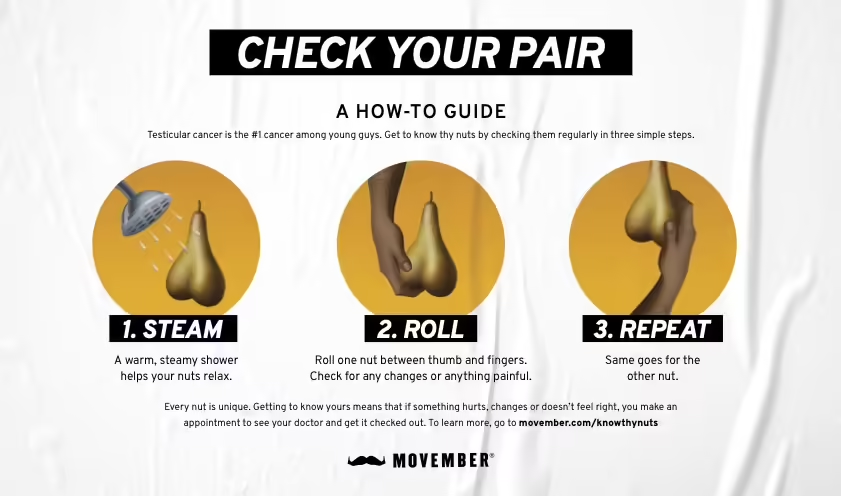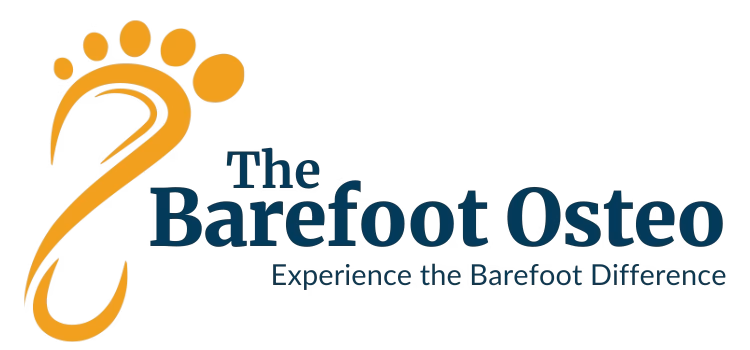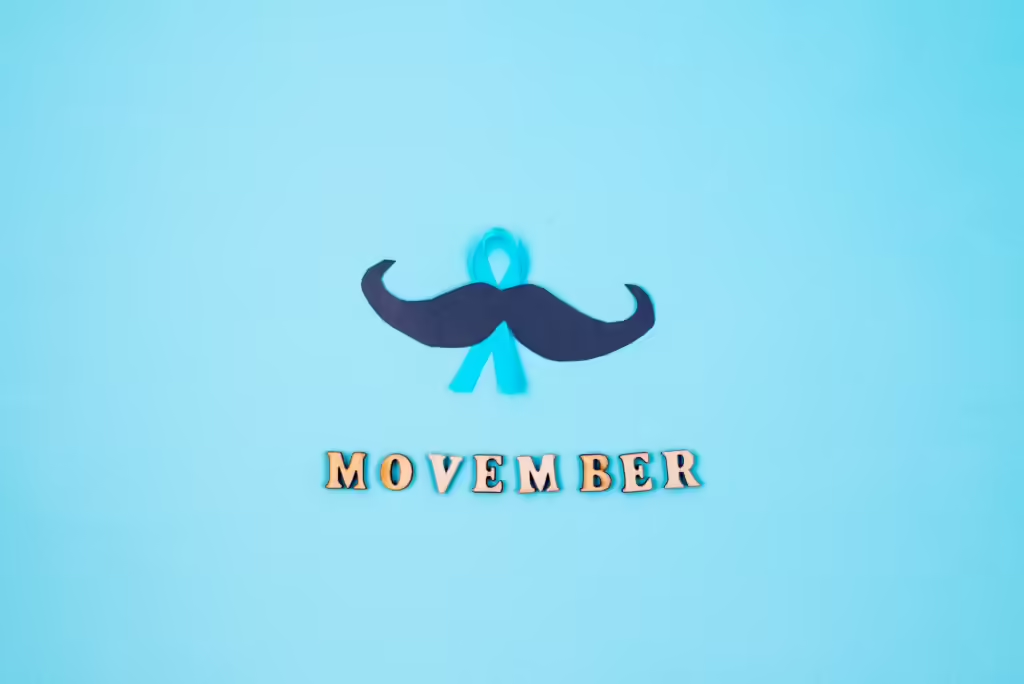Movember isn’t just about growing a moustache—it’s about starting meaningful conversations around men’s health. This Movember men’s health awareness campaign encourages us to address and prioritize these unique challenges. Men often face health issues, from mental health struggles to specific physical illnesses, but too many of these issues remain unspoken. This Movember, let’s break the silence and take proactive steps to address these challenges head-on. In this post, we’ll explore men’s mental health, prostate cancer, testicular cancer, and general health tips—all with a focus on empowering you to live a healthier, fuller life.

The History of Movember
Movember began in 2003 in Melbourne, Australia, when a group of friends decided to bring back the moustache as a bit of fun. From those humble beginnings, it grew into a global movement committed to tackling the biggest health issues faced by men—prostate cancer, testicular cancer, and mental health challenges. Since its inception, Movember has funded over 1,250 men’s health projects around the world, creating resources, raising awareness, and encouraging men to take control of their health. It’s not just about raising funds, but also about building a culture of support, openness, and proactive health management. By championing early detection and open conversations, Movember has had a significant impact on reducing stigma and supporting men’s health.
Men’s Mental Health & Suicide Prevention
The Silent Crisis
Mental health can be a tough topic, especially for men. The reality is that men are disproportionately affected by mental health issues, and they often suffer in silence. In fact, suicide rates among men remain alarmingly high. It’s crucial that we understand why: societal pressures, a culture of “toughness,” and limited open conversations can make it difficult for men to reach out.
Identifying Signs
It’s time to tune into our own well-being and those of our mates. Feeling unusually irritable? Have you been withdrawing from activities you used to enjoy? These are just a few of the signs that might indicate mental health struggles. Recognizing these signals early can be a game-changer.
How to Take Action
The most empowering thing anyone can do is ask for help—whether it’s speaking to a friend, reaching out to a healthcare professional, or simply acknowledging your emotions. Support is out there, and so many people are ready to listen. Movember campaigns provide resources and a community dedicated to this cause, offering men the opportunity to speak openly and receive support.

Breaking the Stigma
One of the biggest barriers to seeking help is the stigma surrounding mental health. It’s time we change the narrative. Let’s redefine what strength means—real strength is being vulnerable, reaching out, and taking care of oneself. By speaking up, we not only help ourselves but also inspire others to do the same. The Movember men’s health awareness movement is creating safe spaces for these conversations to happen, helping to dismantle the stigma piece by piece.
Stories that Inspire
Hearing how others have tackled their mental health struggles can be a beacon of hope. Many men have shared stories of overcoming depression and anxiety through community support, therapy, and lifestyle changes—all reminders that you are never alone in this journey. For example, David, a Movember ambassador, shared how reaching out to a support group changed his life, giving him the tools and community he needed to manage his depression.
Practical Tips for Mental Well-being
- Stay Active: Physical activity is a natural mood booster. Even just 20-30 minutes of walking a day can have a significant impact on your mental health.
- Stay Connected: Reach out to friends and family. Maintaining social connections can help combat feelings of isolation.
- Mindfulness and Relaxation: Practice mindfulness, deep breathing exercises, or meditation to help reduce stress and maintain a sense of calm.
- Limit Alcohol and Substance Use: Excessive drinking or substance use can worsen mental health issues. Try to limit these behaviors and seek help if they become problematic.

Prostate Cancer Awareness
Understanding Prostate Cancer
Prostate cancer is one of the most common cancers affecting men. The good news? If detected early, it’s highly treatable. Knowing the risk factors—age, family history, and lifestyle—is the first step to staying on top of your health.
Screening and Early Detection
It’s easy to put off doctor’s appointments, but early detection, especially during the Movember men’s health awareness campaign, can make all the difference. Men over 50 (or 45 if you’re at higher risk) should consider having regular screenings. It’s not just about reacting to symptoms; it’s about taking proactive control of your health.
Types of Screenings
- PSA Test: The Prostate-Specific Antigen (PSA) blood test measures the level of PSA in your blood. Elevated levels can indicate prostate issues, including cancer.
- Digital Rectal Exam (DRE): This is a physical exam where a doctor checks the prostate for abnormalities. While it may feel uncomfortable, it’s an important step in early detection.

Prevention and Lifestyle Changes
While you can’t control your genes, you can take steps to improve your health. Regular exercise, maintaining a healthy weight, and keeping alcohol consumption moderate are all ways you can reduce your risk. The small, consistent actions can be incredibly empowering.
Diet and Nutrition for Prostate Health
- Eat a Balanced Diet: Foods rich in antioxidants, like fruits and vegetables, can help support prostate health. Tomatoes, berries, and leafy greens are particularly beneficial.
- Reduce Processed Foods: Limiting processed meats and foods high in unhealthy fats can lower your cancer risk.
- Healthy Fats: Incorporate sources of healthy fats, such as olive oil, nuts, and fish, into your diet.
Support Networks
If you or someone you know is diagnosed, remember there’s a community ready to help. Support groups provide a space for sharing experiences, and knowing you have others by your side can make all the difference in tackling prostate cancer. Here are some resources that can help:
- Prostate Cancer Foundation of Australia: Offers a helpline, support groups, and resources for those affected.
- Movember’s True North Program: Provides guidance and support for men navigating life after a prostate cancer diagnosis.
- Local Support Groups in Warrnambool: Check with local hospitals or community centers for in-person support groups in your area. Connecting with others who understand your journey can be incredibly empowering.
- When to Reach Out: If you’re feeling overwhelmed, isolated, or simply unsure of your next steps after a diagnosis, it’s time to reach out. You don’t have to do this alone.
John, who was diagnosed with prostate cancer at age 52, shared how attending a support group not only helped him understand his treatment options but also provided him with lifelong friendships. He encourages other men to seek support as early as possible, emphasizing that community can be a powerful force in the healing process.

Testicular Cancer Awareness
What is Testicular Cancer?
Testicular cancer primarily affects younger men, between the ages of 15 and 45. It’s highly treatable, especially when caught early. Raising awareness around self-examination is vital for early detection and treatment.
Self-Examination
Here’s a proactive step every man can take: check yourself regularly. Spend a few minutes every month to feel for lumps, hardness, or anything unusual. If something doesn’t feel right, don’t wait— reach out to a healthcare provider.
Symptoms and Treatment
Common symptoms include swelling or discomfort in the testicles. The important thing to remember is that early treatment can lead to highly successful outcomes. Let’s remove the stigma around discussing testicular health—after all, it’s just another part of our bodies that needs looking after.
Personal Stories and Support
Many men who have experienced testicular cancer share how they’ve faced it head-on, learned to listen to their bodies, and leaned on loved ones. Their courage is a powerful reminder of the importance of community and resilience. For instance, Tom, a testicular cancer survivor, shared how early detection saved his life. He urges other young men to do monthly self-exams, emphasizing that it’s a small step that can make a world of difference.
Raising Awareness
Education is key to early detection. By encouraging open dialogue about testicular health and emphasizing the importance of self-exams, we can help reduce the stigma. Sharing information on social media or simply having conversations with friends can make a big impact.

General Men’s Health Tips
Building Holistic Health
True health is about more than just physical fitness—it’s about Stability, Mobility, and Balance in both body and mind. Movember is a great reminder to take a holistic approach to our health, focusing on all aspects of well-being.
Lifestyle Habits for Lifelong Health
Healthy eating, regular exercise, and staying away from smoking are key factors in living a longer, healthier life. Remember, even small changes can make a huge difference—like taking a daily walk or swapping a sugary snack for a piece of fruit.
Routine Health Check-Ups
Prevention is power. Make a checklist of routine health screenings—including blood pressure, cholesterol, and cancer checks—that will keep you informed and in control of your health.
Mental and Emotional Well-being
- Sleep: Quality sleep is crucial for both mental and physical health. Aim for 7-8 hours of uninterrupted sleep each night.
- Stress Management: Practice stress-reducing techniques like yoga, tai chi, or even journaling to maintain emotional balance.
- Stay Curious and Engaged: Hobbies, learning new skills, and engaging in activities you enjoy can keep your mind sharp and your mood positive.
Social Connections & Community
Movember men’s health awareness reminds us that social connections are just as important for mental health as they are for physical health. Never underestimate the power of staying connected. Social connections are just as important for mental health as they are for physical health. Make an effort to catch up with friends, join a group, or get involved in the community. Together, we can foster an environment where men feel empowered to look after themselves and each other.

How to Get Involved in Movember
Grow a Mo
Growing a moustache is a fun and impactful way to raise awareness for men’s health. It’s about sparking conversations, challenging norms, and being part of something bigger.
Move for Movember
Get moving this Movember. Take on the challenge of walking or running 60 km over the month— one for each man we lose to suicide every hour globally. Moving for a cause not only raises awareness but also boosts your physical and mental health.
Host an Event
Whether it’s a trivia night, a group fitness session, or a casual gathering, hosting an event is a powerful way to bring people together for a shared cause.
Donate and Spread the Word
Every contribution counts. Whether it’s a donation, a social media share, or simply talking about men’s health, you’re helping to change the face of men’s health for the better.
Support a Mate
Sometimes getting involved is as simple as being there for a friend. If you notice a mate struggling, reach out. A small gesture—like inviting them for a coffee or letting them know you’re there to listen—can make a world of difference.

Conclusion
This Movember, let’s make a powerful commitment to prioritize men’s health. Whether it means having those tough conversations about mental health, scheduling a check-up with your doctor, or simply reaching out to a friend who might be struggling—every action counts. By taking these proactive steps, we can foster a community where men feel supported, understood, and empowered to take control of their well-being. For more information, visit the Movember Website and get involved today
Together, we have the ability to challenge the norms, break down harmful stigmas, and build a network of connection and support. Remember, small positive actions today can create a ripple effect for healthier, happier tomorrows. Let’s stand united for the men in our lives—fathers, brothers, friends—and ensure no one feels alone in their health journey.
Subscribe to our newsletter for valuable health tips, stories of hope, and Movember updates, and consider booking a holistic health consultation to create a proactive, personalized plan that puts your health first. Together, we’re in this for a healthier future—let’s take action this Movember and beyond.







